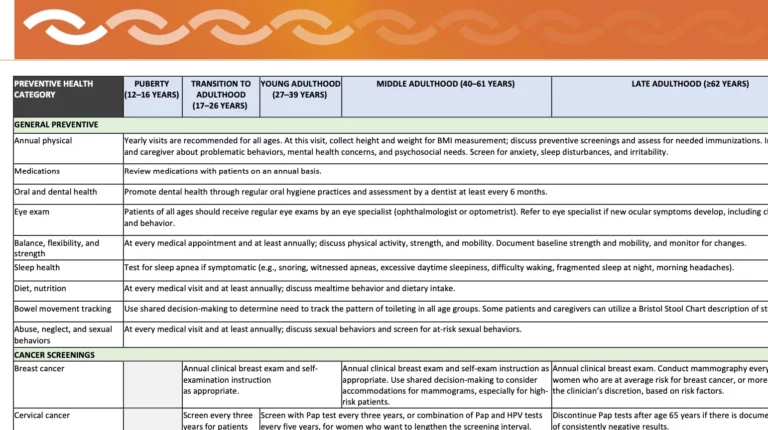Clear all filters
Staying Healthy

Useful Information about Preventive Care
As part of its free course, Clinical Care for Autistic Adults, Harvard Medical School developed a useful time line for preventive health care screenings and immunizations for autistic adults.
This downloadable and printable Autism Preventive Health Table was developed as part of the Harvard Medical School’s course, Clinical Care for Autistic Adults. It lists baseline preventive health care screenings and immunizations for autistic adults. The intended audience is primary care physicians but feel free to use as a reference and to share with your PCPs or other providers. Key points for caregivers and self-advocates to note:
Schedule all annual exams well in advance so that the appointment happens at a time of year and time of day that works best for the patient/family.
If possible, gather information about health conditions that can run in families such as heart problems, cancer, diabetes, depression, and addiction. This information can help identify the most important screenings and how often they should be done.
A guide to share with providers for preventive health care
The information on the table is based on the following sources:
Adult Immunization Schedule by Age, CDC, 2023.
CDC: Cancer Screening Tests. Accessed on April 1, 2023.
Dhanasekara CS, Ancona D, Cortes L, et al. Association Between Autism Spectrum Disorders and Cardiometabolic Diseases: A Systematic Review and Meta-analysis. JAMA Pediatr. 2023;177(3):248-257. doi:10.1001/jamapediatrics.2022.5629
Isenberg BM, Yule AM, McKowen JW, Nowinski LA, Forchelli GA, Wilens TE. Considerations for Treating Young People With Comorbid Autism Spectrum Disorder and Substance Use Disorder. J Am Acad Child Adolesc Psychiatry. 2019;58(12):1139-1141. doi:10.1016/j.jaac.2019.08.467
Massachusetts Department of Developmental Services Adult Screening Recommendations 2019, Mass.gov.Accessed on April 1, 2023.
Schick, Elizabeth, Is It Safe to Sedate our Son at the Dentist? Autism Speaks. 2014. Accessed on April 1, 2023.
Screening and Preventive Interventions for Oral Health in Children 5 Years and Older and Adults, U.S. Preventive Services Task Force. Accessed on April 1, 2023.
Sexually Transmitted Infections Treatment Guidelines, 2021, CDC. Accessed on April 1, 2023.
Dr. James Bath, a primary care physician for autistic adults at the MGH Lurie Center for Autism, discusses the importance of preventive care as key to a long, healthy life:
Dr. James Bath, Adult Primary Care Physician at the MGH Lurie Center for Autism

Dietary Concerns
Documented food allergies are twice as common in children and adolescents with autism (10%-16%) compared to their neurotypical peers. Due to this prevalence, it’s possible that there are autistic adults...
Documented food allergies are twice as common in children and adolescents with autism (10%-16%) compared to their neurotypical peers. Due to this prevalence, it’s possible that there are autistic adults with existing food allergies that might not have been diagnosed in their younger years. Autistic adults who have been classified as selective – or picky – eaters might be avoiding food that simply does not make them feel well, whether it a true allergy or a food intolerance.
Food allergy vs food intolerance
Food allergies are a function of the immune system and can be mild or life-threatening; food intolerances take place in the digestive system and can cause significant discomfort. Harvard Health explains the difference and why it matters.
If there are persistent symptom of gastrointestinal distress, it can be helpful to keep a food diary or food log to see if incidents of nausea, vomiting, itching, diarrhea, hives and constipation can be tied to certain kinds of foods.
The Centers for Disease Control has a free, downloadable example of a simple food diary that can help patients record eating habits.
Special diets
In the early 2000s, some families of autistic children experimented with specific diets (gluten-free/casein-free, specific carbohydrate) to help address physical and behavioral issues. Although some positive results were shared, in some cases, these diets caused nutritional deficiencies that may have followed patients into adulthood. As a result of his work with autistic patients with digestive issues, Dr. Tim Buie, a pediatric gastroenterologist at Boston Children’s Hospital, doesn’t recommend a specific diet for autistic persons. Rather, he concurs that tracking and understanding what foods keep someone happy and healthy play a big role in overall GI health for autistic people.
Dr. Buie explains the role of food choices and special diets in autistic patients:
Dr. Tim Buie, MD, Gastroenterologist at Boston Children’s ospital
Picky eating
Many autistic adults gravitate toward (or avoid) foods that are a certain color or texture, or they may eat the same foods, day after day, for months or even years. These preferences are not indications of food allergies, especially if there are no symptoms of discomfort. Autistic adults don’t necessarily have to eat a wide variety of foods at every meal to meet their nutritional needs. For caregivers of autistic adults, it is important to support food choices to the extent that it’s possible and practical if they are healthy and they eat a reasonably balanced diet.
Dr. Buie understands the frustration of caregivers who worry about picky eating tendencies:
You get to be picky, just like I get to decide whether I’ll eat asparagus or not. You know, I think all of us have particular food preferences where we tend to avoid them. They become a problem when they’re impacting nutrition or when they’re impacting weight or balance in some way.
Dr. Tim Buie
Children with autism are 40% more likely to be obese as adults. Research has noted this risk but has not established an underlying cause. Genes, family history, cultural background, medication and eating habits may all play a role. An important part of adult health care is discussing nutrition with a PCP as part of managing overall good health. Weight gain or weight loss from over or under eating specific foods will be part of any yearly exam discussion with a PCP (any significant weight gain or loss should always prompt an immediate appointment). Diet and weight gain are important issues to be raised with caregivers and group home providers and staffs to assure that autistic adults have balanced diets and get regular exercise.
Celiac Disease
Celiac disease is an autoimmune condition in which ingesting gluten triggers a complex inflammatory reaction. It is no more common in autistic people than in the general population, but it is now more frequently recognized in all patients. Symptoms of celiac disease include:
Diarrhea
Weight loss or inability to gain weight
An increase in abdominal discomfort
If these symptoms exist or there’s a family history of celiac disease, a gastroenterologist can test for it through a blood test or biopsy.

Dietary Plan Tool for Schools and Day Programs
Autistic adults with special dietary needs and behaviors around food can benefit from a form that outlines those needs and the best interventions for use at school or day programs.
Autistic adults with special dietary needs and behaviors around food can benefit from a form that outlines those needs and the best interventions for use at school or day programs. Many school districts have a similar form for the school nurse but that information doesn’t always follow the adult after they turn 22.
We’ve designed an easy-to-use template based on the dietary information school districts require.
